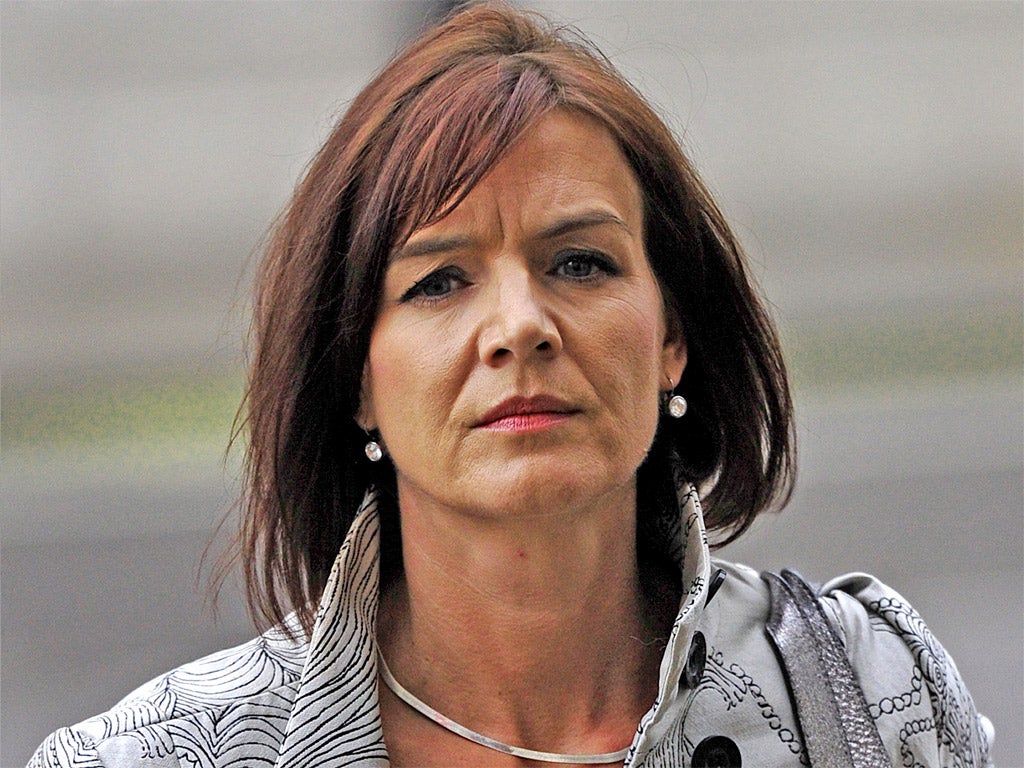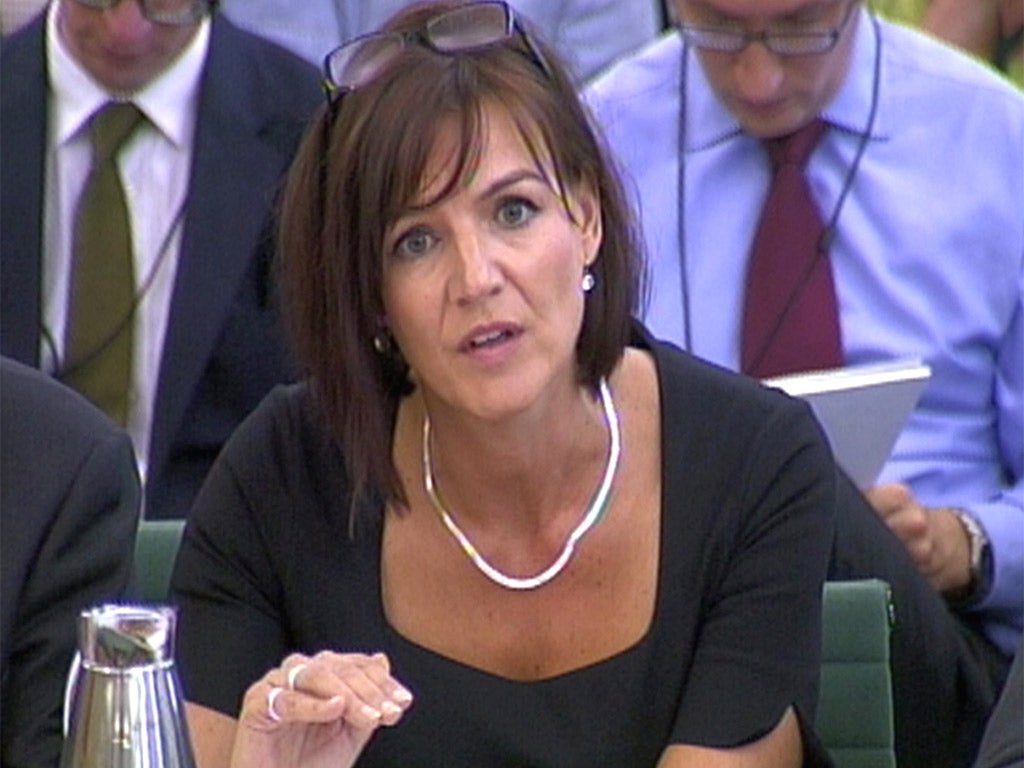Departing BBC director Lucy Adams using licence fee cash to back fight against journalists' union
Head of human resources turned to lawyers over 'highly defamatory' claims of 'dirty tricks' operation

Your support helps us to tell the story
From reproductive rights to climate change to Big Tech, The Independent is on the ground when the story is developing. Whether it's investigating the financials of Elon Musk's pro-Trump PAC or producing our latest documentary, 'The A Word', which shines a light on the American women fighting for reproductive rights, we know how important it is to parse out the facts from the messaging.
At such a critical moment in US history, we need reporters on the ground. Your donation allows us to keep sending journalists to speak to both sides of the story.
The Independent is trusted by Americans across the entire political spectrum. And unlike many other quality news outlets, we choose not to lock Americans out of our reporting and analysis with paywalls. We believe quality journalism should be available to everyone, paid for by those who can afford it.
Your support makes all the difference.The BBC is using the licence fee to pay the legal fees of its controversial and departing £320,000-a-year head of human resources after she instructed lawyers to "take matters further" when a trade union made claims of a "dirty tricks" operation at the broadcaster.
Lucy Adams, who has announced she is leaving the corporation in March to "try something new", was heavily criticised over her role in the BBC executive pay scandal. Stewart Jackson MP, a member of the Public Accounts Committee (PAC), the parliamentary watchdog, said she "presided over" a culture of "corporate fraud and cronyism".
But the BBC is paying Ms Adams's fees after she turned to lawyers over what she said were "highly defamatory" claims made by the National Union of Journalists, which published a statement in August about an alleged campaign by the BBC human resources department of "hacking staff emails and bullying employees into spying on colleagues".
The NUJ's claims were instantly dismissed by the BBC as "false and without foundation". Ms Adams, who complained of "an unwarranted and very personal attack", instructed libel lawyers.
In response to a Freedom of Information request seen by The Independent, the BBC has confirmed that it is paying Ms Adams's legal bills. "As the NUJ article made serious and damaging allegations against Lucy Adams in her role as the BBC's Director of Human Resources, the BBC has agreed to fund the reasonable costs of Ms Adams seeking external legal advice," it said.
The BBC said Ms Adams could receive further financial support if she decides to proceed further with any legal action. "The funding currently covers the provision of legal advice to Ms Adams prior to the issue of proceedings and her lawyer's costs must be approved by the BBC in advance in incremental caps, with an explanation of the work that needs to be undertaken," it said.
Mr Jackson, a Conservative MP, said that he would be asking senior BBC figures to explain the payments to the PAC. "The BBC seems to have learned nothing from the recent exposure of its largesse and profligacy with license fee-payers cash and culture of corporate greed and cronyism," he said. "If this is the case, I will press for the senior management and Trust Board to return to the Public Accounts Committee and fully account for this inappropriate expenditure."
Paul Farrelly MP, a Labour member of the Culture, Media & Sport committee, said he was surprised that Ms Adams had not already left the BBC. "What is still a mystery is why she's still there, having been part and parcel of a culture that the new Director General said he wants to leave behind. If the BBC is funding a defence to a libel action that is more personal than professional then the BBC Trust must ask searching questions of the BBC executive."
In a damning report into executive pay-offs at the BBC this year, the National Audit Office found that the organisation had made severance payments totalling £60m to 401 senior managers since 2005. Ms Adams, who joined the BBC in 2009, having previously worked at the legal firm Eversheds and the outsourcing giant Serco Group, has told MPs she was under pressure to reduce costs and get executives "out of the door as quickly as possible". She informed Director General Tony Hall this summer that she was leaving in the spring of 2014.
Lord Patten, chair of the BBC Trust, told the PAC that the executive pay-offs at the BBC had caused him "shock and dismay". During her evidence to MPs, Ms Adams was criticised by committee chairman Margaret Hodge who said: "You're developing a habit of changing your evidence."

The HR director was deeply unpopular among BBC staff and the news of her departure was greeted with cheers in some of the organisation's newsrooms. But Lord Hall said he would be "sorry to see her go".
It is not the first time that the BBC has providing licence fee money to pay for senior executives to defend their personal reputations.
During Nick Pollard's review of the BBC's handling of the Savile scandal, the corporation spent £101,000 of the total £2.4m cost on paying the "legal and related costs" of the under-fire Director of BBC News, Helen Boaden, who was on a salary of £354,000. Pollard criticised Ms Boaden's handling of the scandal. "The division she headed was in virtual meltdown, and I would have expected her to have taken a more active role in resolving things." The review reported that Ms Boaden, now director of BBC Radio, offered to step down over the matter but her resignation was refused by Director General George Entwistle.
When Mr Entwistle quit his job over the Savile and Lord McAlpine scandals, the BBC paid his personal lawyers and public relations advisers as he faced a barrage of criticism over a settlement worth £450,000. Some £10,000 was paid by the BBC for the legal advice Mr Entwistle received in securing that pay-off. He was paid another £10,000 from the licence fee to cover his "communications costs" during the turbulent period. The broadcaster paid £107,000 for Mr Entwistle's costs during internal inquiries into the scandals. Mr Entwistle's predecessor as DG, Mark Thompson, received £86,000 for legal fees incurred during Pollard's review.
Join our commenting forum
Join thought-provoking conversations, follow other Independent readers and see their replies
Comments